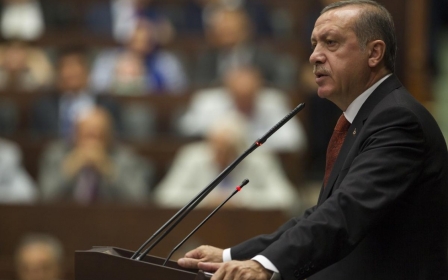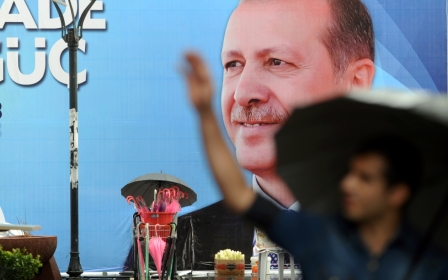Erdogan's PM choice set to define his presidency

ISTANBUL, TURKEY - Turkey elected its first ever president by popular vote on Sunday. Prime minister for the past 11 years, Recep Tayyip Erdogan secured 51.79 percent of the votes in the first round, paving his way to become head of state for the next five years.
The election turnout was lower than any national vote since the Justice and Development Party (AKP) took office 12 years ago. Only 41 million out of 55 million voters went to the polls, resulting in a turnout rate of 74 percent. During local elections last March, the rate was 89.15 percent.
Immediately after the announcement of the unofficial results, heated debates on the significance of the turnout rate flooded TV screens and social media, while Erdogan delivered his victory speech to the nation.
After passing commiseration messages to his opponents, Erdogan reiterated that he will be the president for all the 77 million Turks living in the country. "No one has lost this election - except the status quo," he said in an address from the balcony of his party headquarters in Ankara.
Constitutional debate
Perhaps his most striking remark was regarding the drafting of a new constitution. The 1982 constitution that was written under the conditions of the 1980 coup d'état, is often criticised for shortcomings when it comes to individual rights and freedoms.
Noting his party's previous attempts to draft a new constitution, which stalled in 2013, Erdogan said, "We sent only three members to the committee on constitution with 326 AKP MPs. The remaining three parties combined provided nine members for the committee, with only 220 MPs in total."
The government party had the right to send many more MPs to the committee as the number of AKP MPs was proportionately much higher.
"We came to an agreement on 60 articles, but could not finalise it," Erdogan explained, signalling his intention to revive the drafting process once again after 2015 general elections.
Erdogan's aspirations to change the constitution are not a secret. The current debate goes hand in hand with his intention to change the political system from a parliamentary democracy to a full presidential system. A new constitution is a must for this purpose.
However, the power to change the constitution lies within the parliamentary realm, the body which Erdogan will no longer be able to influence directly, as he will resign from his party as well as from his post as prime minister on 28 August.
Changing the constitution requires 330 parliamentary seats. Though AKP acquired more than 49 percent of the votes in the last general elections of 2011, it currently holds 313 seats.
Erdogan expects to secure more than 330 seats in the next term by acquiring more than 50 percent of the votes in the upcoming general elections. For this reason, the percentage of the presidential election could be an important indication.
Though he personally secured more than 50 percent last week, the actual number of votes does not necessarily predict the upcoming general elections to be easy. For instance, had the turnout rate been the similar to previous general elections, which historically lie within the range of 80-90 percent, Erdogan's votes might just have been much less than 50 percent, which would have resulted in a run-off vote.
For Semih Idiz, a columnist at Hurriyet Daily News, this is a clear sign why the AKP must be extra careful when planning its future. "The local elections in March exposed the limits of AKP votes," he told MEE. "Even if AKP forms the government again, it must surpass its previous achievements, a situation that I find very unlikely given the latest election results."
This situation might lead Erdogan to bypass, or at least delay writing a new constitution, and employ other methods to assert his power.
According to Kadri Gursel at daily Milliyet, failing to write a new constitution is a plausible outcome. In the meantime, Erdogan will seek to govern the country as president, through influencing the AKP to elect a weak prime minister or "cabinet chairman".
"Erdogan’s presidency will be an authoritarian, constitutionally incomplete 'a la carte' presidential regime," he wrote.
Conversely, Galip Dalay, a political researcher at the Ankara based think tank, SETA Foundation, thinks that influencing the party to elect a weak figure would be one of the biggest harms that Erdogan could inflict to the AK Party. "I believe that Erdogan will retain a psychological connection to his party, but the new leader should be a strong individual," he told MEE.
For Dalay, a weak figure that matches Gursel's description could have a similar fate to that of Yildirim Akbulut in early 1990s. After becoming president in 1989, Turgut Ozal "appointed" him as prime minister. Akbulut, a rather feeble figure who would abide by Ozal's directions, lost the Motherland Party's leadership to Mesut Yilmaz in 1991. This ultimately torpedoed Ozal's aspirations to interfere in executive affairs.
"Neither at this stage, nor just after the 2015 general elections, do I think there will be another attempt to change the constitution," Dalay said. "The main reason behind the stalling of the 2013 draft constitution was a strong reaction against a change in the political system; this reaction was also seen in spheres within the government party."
Dalay believes that if Erdogan could establish effective "synergy" with the new prime minister, he could already become a de facto president, by benefiting from full-fledged executive powers.
According to Idiz, an attempt to govern as a de facto "shadow prime minister" would be an improbable scenario. "All the steps that Erdogan would make are bound to face opposition resistance, and likely to be carried to the constitutional court," he said. "Therefore, Erdogan would ideally push for a de jure presidency, which again is highly unlikely."
The new prime minister
AKP will hold its party congress on 27 August to select a new PM and chairperson; one day before Erdogan's presidential inauguration and perhaps most importantly, one day before the termination of the current president, Abdullah Gul's term.
This decision was made on Monday, during the central party executive committee meeting. Meanwhile, Gul declared his intention to return to his former party. As long as Gul does not resign as president before the actual termination date of his term, he will not be able to run for chairmanship.
The situation is exemplary for the big challenge that the AK party faces in the new era which dawns. "It appears that the AKP will have a serious leadership problem," Idiz said. "The new leader should be a compliant individual, but at the same time he/she should be powerful enough to lead the party to victory. Given the circumstances, I cannot name anybody in the party with these qualifications."
While Gul's motivation and plans are yet to be seen, his credentials make him the strongest candidate, if not the most probable one. "A strong individual like Gul would not submit himself to Erdogan," Idiz further argued. "And it seems that Erdogan has managed to prevent Gul from taking over the party leadership."
Contrastingly, Dalay argues that the path to the AK Party's success is not in the hands of individuals, but it is a matter of institutionalisation; As the Turkish electorate consolidated their political preferences into four main parties, politics in Turkey would revolve around day-to-day policies and projects that these parties would generate next year.
"Currently the AK Party's constituency is around 50 percent, more than two-thirds of them are grassroots; the rest tend to shift depending on the political conjuncture. Convincing them mostly depends on party policies, rather than its leadership," Dalay told MEE.
"I do not think that Erdogan's departure would have a significant impact on the party's votes in the next elections," Dalay further elaborated. "What I see as the biggest threat is that intra-party governance mechanisms do not function properly. Since the Gezi Park protests and the 17 December corruption probe, the party is shifting away from these mechanisms."
However, Dalay is uncertain whether these intra-party mechanisms, which are the basis for further institutionalisation, could be in restored in the near future. He also doubts whether the new chairperson will stand firmly in the presence of Erdogan.
"If not, this would inflict a great damage on the AK Party."
New MEE newsletter: Jerusalem Dispatch
Sign up to get the latest insights and analysis on Israel-Palestine, alongside Turkey Unpacked and other MEE newsletters
Middle East Eye delivers independent and unrivalled coverage and analysis of the Middle East, North Africa and beyond. To learn more about republishing this content and the associated fees, please fill out this form. More about MEE can be found here.




